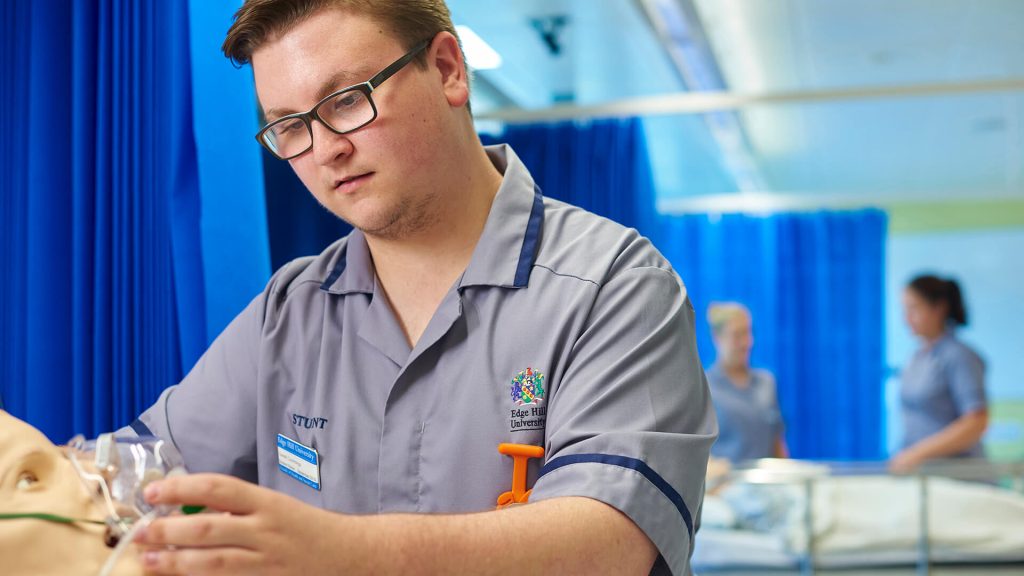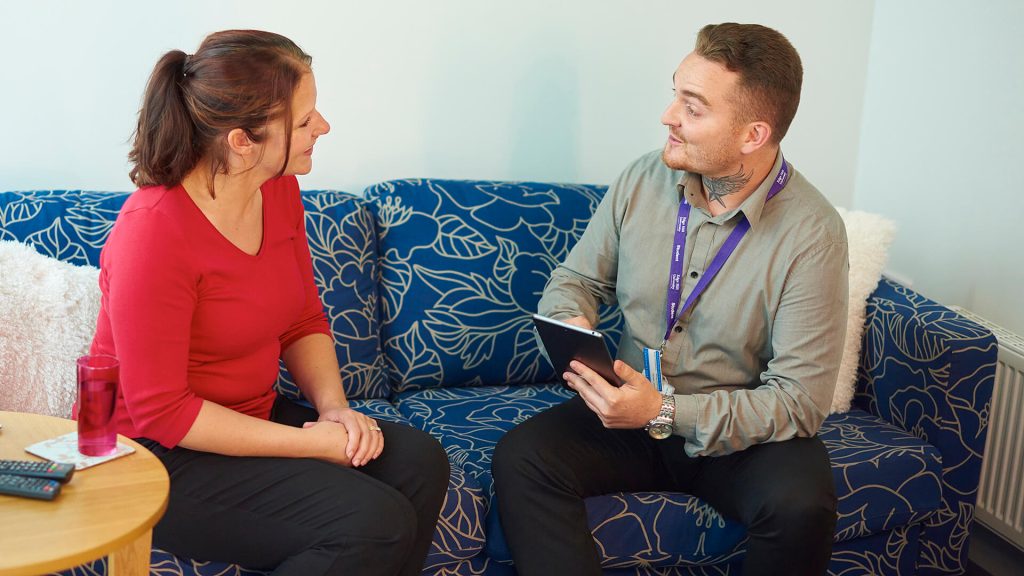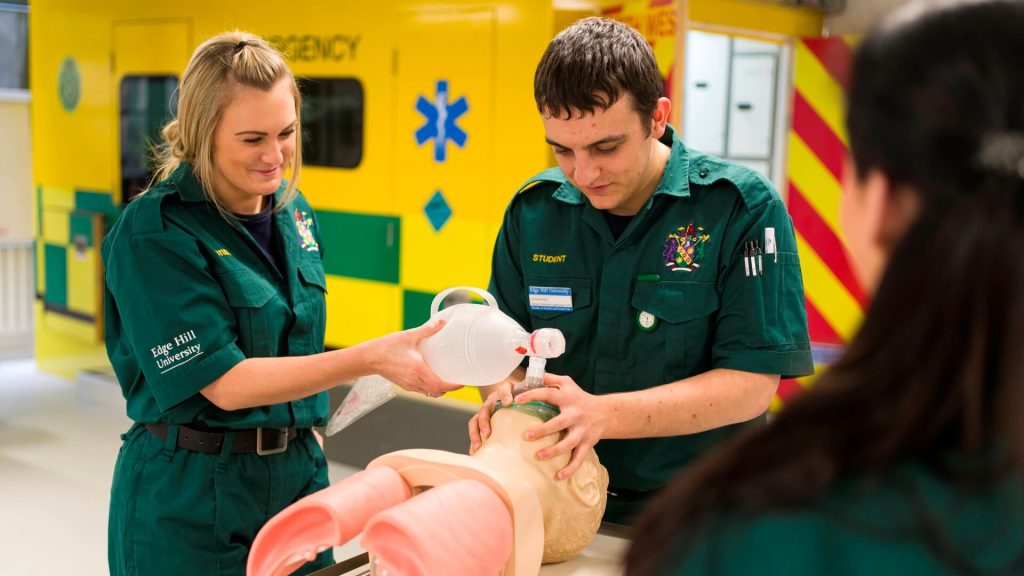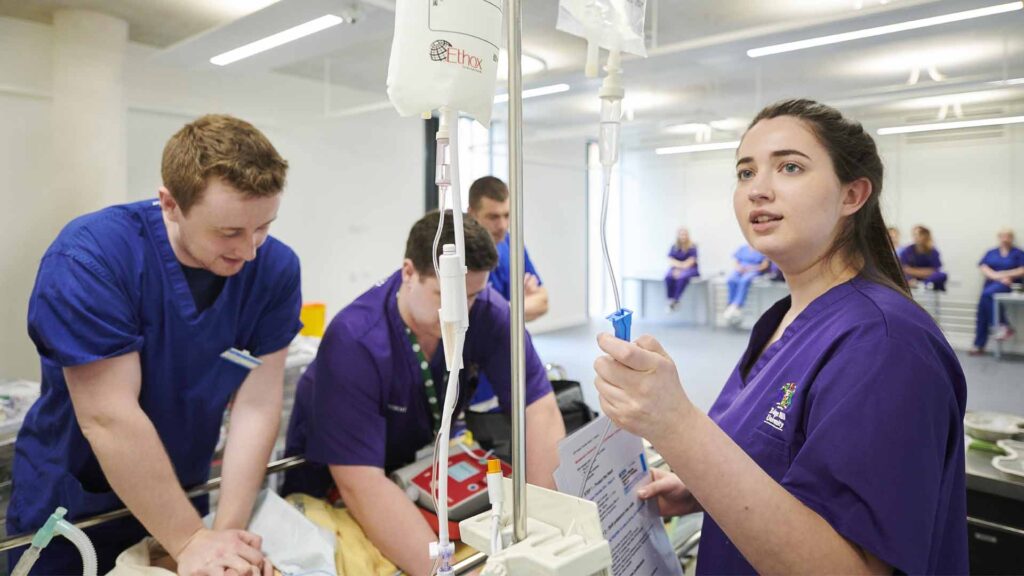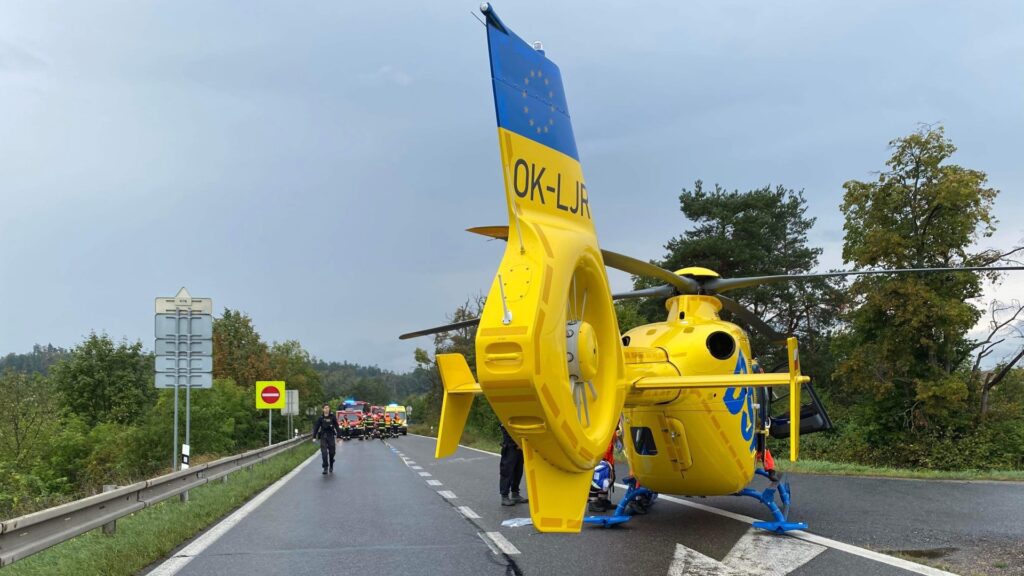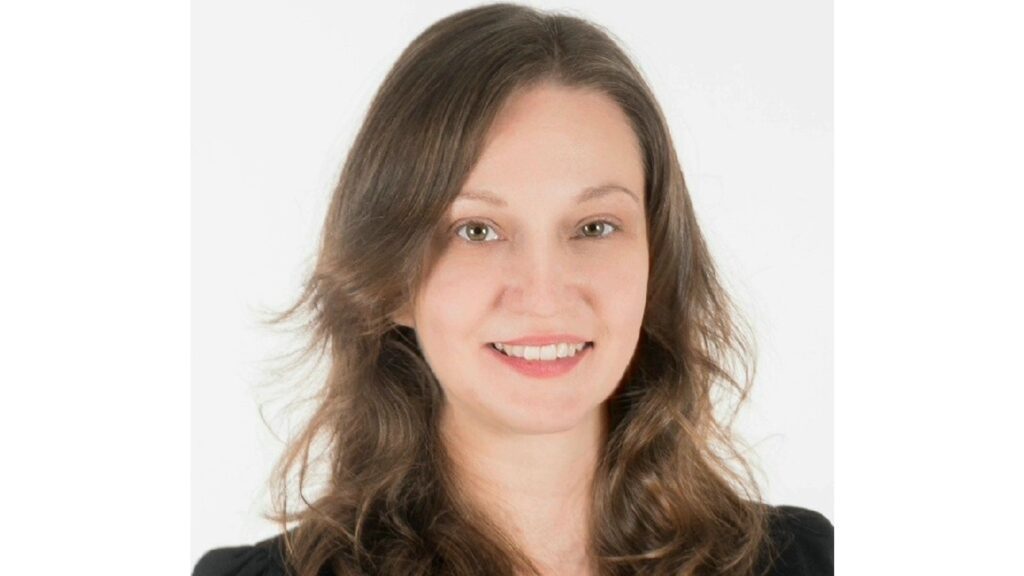Operating Department Practice BSc (Hons)
UCAS code: B991
Train to provide high standards of care for people during the anaesthetic, surgery and recovery phases of surgical treatment. After graduation, you’ll be eligible to register as an Operating Department Practitioner with the Health and Care Professions Council.
Overview
| Course length: | 3 years full-time |
|---|---|
| Start dates: | January 2025 September 2025 |
| Location: | Edge Hill University or St James’ (Manchester) |
| Example offers: | BCC-BBC (A Level) or DMM (BTEC) View full entry criteria |
| Subject(s): | Operating Department Practice |
| Faculty: | Health, Social Care and Medicine |
| Department: | Allied Health, Social Work and Wellbeing |
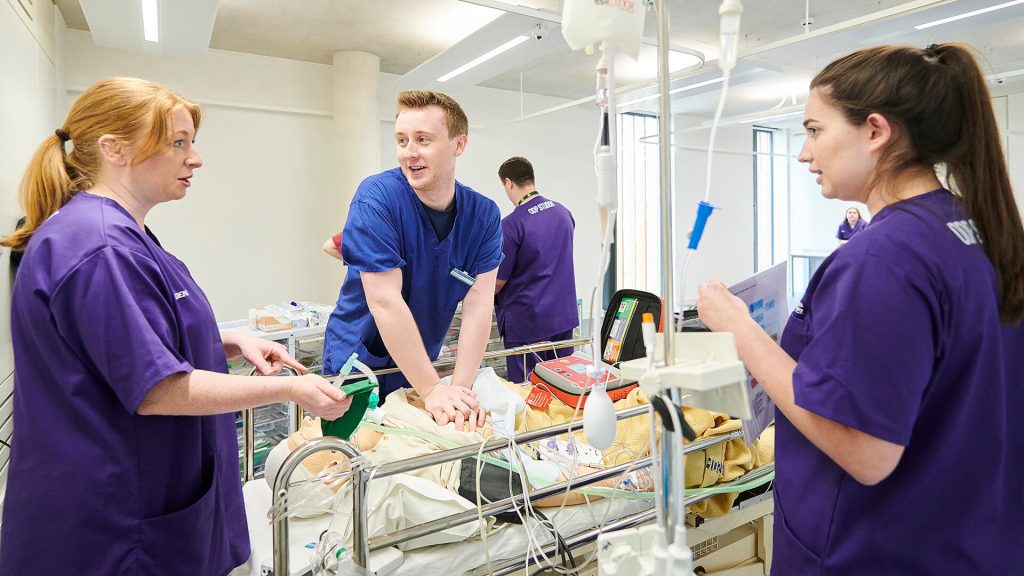
Operations are complex and there’s a big demand for care experts at each stage of a patient’s perioperative journey.
Operating Department Practitioners (ODPs) are a vital part of the perioperative process. Working as part of a team in this specialist and dynamic environment, it’s crucial they’re knowledgeable in surgical, anaesthetic and recovery procedures, anatomy and physiology, illness and disease, and overall patient care, as well as legal and ethical issues.
During this operating department practice degree, you’ll dissect areas like health, research, perioperative skills and procedures, and pharmacology. Learn how to treat and communicate with compassion, making patients of all ages feel at ease in the face of potentially life changing procedures.
During our operating department practice degree, you’ll get hands-on experience and a feel for the pace of life in a real operating department in a variety of settings. Depending on where you live, your clinical placement could be in the Merseyside, East Cheshire or Greater Manchester region.
You can choose to study this course at Edge Hill’s Ormskirk campus or St James’, our Manchester city centre location.
An approved degree
Following graduation, you’ll have the skills that enable you to apply for registration with the Health and Care Professions Council (HCPC) as a qualified ODP.

Course features
-
Professional accreditation
-
Professional practice placements
What you'll study
This course adheres closely to the six core values of the NHS. These values, enshrined within the NHS Constitution, have been developed by patients, the public and staff to inspire passion in the NHS, guide it in the 21st century, and provide common ground for cooperation in achieving shared aspirations.
Familiarise yourself with the basics in Year 1 of your operating department practice degree. You’ll develop your proficiency in a range of procedures and techniques for the perioperative environment, and explore the context in which an operating department practitioner works to deliver safe and compassionate care. Surgery and anaesthetics will be introduced, and you’ll get an overview of basic pharmacology, anatomy, physiology, law and medical ethics.
Explore the care of different patient groups in Year 2. Learn about holistic treatment for patients of all ages and the impact this has on their care. We’ll introduce you to the core methods of research design and how to apply research evidence to real-world practice. Look deeper at the principles of post-anaesthetic care and get to grips with pharmacology. Take your first steps in understanding the importance of medication safety, storage and handling.
Build on your knowledge from the previous two years. Critically reflect on and analyse complex perioperative issues, emergency and trauma situations. Consolidate your basic skills in the three main perioperative areas and enhance them with practice in anaesthetics, recovery and surgical scrub. We also offer the chance to examine some of the more advanced skills required for continuous professional development and career progress. including leadership, management and clinical governance. These experiences will prepare you for registration and life after graduation.
How you'll study
The course is approximately 50% practice and 50% theory. Class sessions are in large blocks and occur throughout the year, followed by the necessary weeks of clinical practice. Teaching takes place at either Edge Hill University’s Ormskirk campus or our St James’ campus in Manchester. This is dependent on where you chose to apply to, and where you’ll be living during the course.
When you are studying in practice, you will be working in a placement in either Merseyside, East Cheshire or Greater Manchester. We will endeavour, where possible, to place you in a placement near to where you live. However, this is dependent on availability of clinical placements within that area so there may well be a degree of travel to and from placements. You’ll be responsible for travel to and from placements but travel costs can be reimbursed.
As operating departments are accessible 24 hours a day you may be required to work at weekends, evenings and night time as well as through the day.
How you'll be assessed
Assessment will be ongoing throughout the programme. Theoretical assessments can consist of exams, written assignments, oral presentations, oral examinations, and practical exams called Objective Structured Clinical Examinations. Practical assessments take place in the clinical placement area and in clinical skills facilities.
Who will be teaching you
The main teaching team for this programme are experienced tutors with an extensive background as nurses and operating department practitioners in perioperative care. In addition, anaesthetists, perioperative practitioners, practice facilitators, workplace mentors and other academic members of staff will be involved in elements of teaching and assessment. The programme team will support you through the provision of a module leader, personal tutor and link teacher who are able to offer academic and pastoral support as required.
Entry criteria
Entry requirements
Typical offer 104-112 UCAS Tariff points, for which no specific subjects are required, plus GCSE English Language and GCSE Mathematics at Grade C or Grade 4 or above (or equivalent).
Eligible candidates must provide evidence of study within the five years prior to application. An interview forms part of the selection process.
If you accept an offer from Edge Hill you will need to satisfy the requirements of the Health and Care Professions Council in respect of physical and mental fitness and will be required to apply for a Disclosure and Barring Service (DBS) Enhanced Disclosure indicating that you meet the mandatory criteria of ‘Clearance to Work with Children and/or Vulnerable Adults’. Further information will be sent to you after you have firmly accepted an offer.
Example offers
| Qualification | Requirement |
|---|---|
| A Level | BCC-BBC. |
| BTEC Extended Diploma (or combination of BTEC QCF qualifications) | Distinction, Merit, Merit (DMM). |
| T Level | Overall grade of Merit. |
| International Baccalaureate (IB) | We are happy to accept IB qualifications which achieve the required number of UCAS Tariff points. |
| Access to Higher Education Diploma | 45 credits at Level 3, for example 9 credits at Distinction and 36 credits at Merit or 15 credits at Distinction and 30 credits at Merit. The required total can be attained from various credit combinations. |
Please note, the above examples may differ from actual offers made. A combination of A Level and BTEC awards may also be accepted.
If you have a minimum of two A Levels (or equivalent), there is no maximum number of qualifications that we will accept UCAS points from. This includes additional qualifications such as Extended Project Qualification (EPQ), AS Levels that haven't been continued to A Level, and General Studies AS or A Level awards.
How to apply
Apply full-time
Read our guide to applying through UCAS to find out more about the application process.
International
EU/EEA and Swiss students who have settled or pre-settled status under the EU Settlement Scheme, as well as Irish nationals, are eligible to apply for this course.
Please note this course is not available to other international students. Please see our A-Z of courses for alternative options.
Should you accept an offer of a place to study with us and formally enrol as a student, you will be subject to the provisions of the regulations, rules, codes, conditions and policies which apply to our students. These are available at www.edgehill.ac.uk/studentterms.
If you join a full time undergraduate degree at Edge Hill University, we will guarantee you the offer of a room in our halls of residence for the first year of your course.
Discover our accommodation
Facilities
The Faculty of Health, Social Care and Medicine offers outstanding facilities for the education and training of health and social care professionals.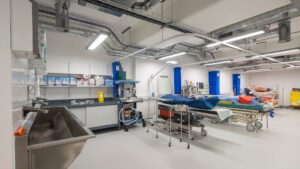
The contemporary teaching and learning resources include leading edge clinical skills facilities, an 860-seat lecture theatre, and a variety of teaching rooms and social learning spaces.
An additional clinical skills suite is available at St James’ in Manchester for students who choose to study there, complemented by teaching rooms, an open plan library and IT facilities.
Where you'll study
Faculty of Health, Social Care and Medicine
Clinical Skills and Simulation Centre
St James' Manchester campus
Learning resources
The Clinical Skills and Simulation Centre offers a variety of simulated environments from home, through primary and emergency care, to secondary care and beyond. The flexible and adaptable facilities include a ward environment, operating theatre, an anatomy and ultrasound resource centre, a ‘Better at Home’ suite, clinical skills area and consultation rooms.
You will benefit from access to a wide variety of healthcare equipment, as well as a range of full-body patient simulators that can breathe, talk, have pulses and can simulate a wide range of symptoms and clinical conditions. This will enable you to undertake practical scenarios in realistic settings, providing ideal preparation for professional practice placements and future employment.
These facilities are complemented by the modern clinical skills facility at St James’ in Manchester city centre. This houses an extensive clinical simulation suite, including a mock operating theatre, simulated ambulance bay and clinical skills stations.

Finance
Tuition fees
UK Full-Time
£9,250
a year
EU/EEA and Swiss students who have settled or pre-settled status under the EU Settlement Scheme, as well as Irish nationals, may be eligible for the UK tuition fee rate.
Financial support
Students on this course may be entitled to the NHS Learner Support Fund if eligible. Visit the NHS Business Services Authority website for further information.
Subject to eligibility, UK students joining this course can apply for a Tuition Fee Loan from the Government to cover the full cost of tuition fees. UK students enrolling on the course may also be eligible to apply for additional maintenance loan funding to help with living costs.
Scholarships
We offer a range of scholarships, which celebrate the determination, commitment and achievement of our students. Many of our scholarships are awarded automatically. There are some however, where you will need to be involved in an application or nomination process. To find out more about our scholarships and check your eligibility, please visit our dedicated scholarships pages.
Money Matters
Please view the relevant Money Matters guide for comprehensive information about the financial support available to eligible UK students, together with details of how to apply for potential funding.
EU/EEA and Swiss students who have settled or pre-settled status under the EU Settlement Scheme may be eligible to apply for financial support. Irish nationals can ordinarily apply to Student Universal Support Ireland (SUSI). Please see our EU student finance page for further details.
Your future career
There’s a national shortage of ODPs, for the foreseeable future, therefore there’s a high demand for operating department practitioners within the UK. After graduation you’ll be well-placed to apply for a job within an operating department in NHS trusts, independent sector hospitals, private medical sales companies, organ transplant teams, or you could continue your research in academia.
Following registration as an Operating Department Practitioner, there’s a fantastic range of patient care roles that you could move into. ODPs are involved in many aspects of critical care, including resuscitation and ICU treatments. Depending on your specialism within the field, you could apply for rewarding roles such as:
- anaesthetic practitioner
- surgical practitioner
- surgical first assistant
- surgical care practitioner
- physicians associate
- non-medical anaesthetist
All NHS staff are encouraged to embrace ‘lifelong learning’, to develop their academic and clinical skills. Some graduates revisit or continue at Edge Hill to sharpen existing abilities and develop new ones.
Our Continued Professional Development courses range from stand-alone modules to Masters level courses.
Course changes
Every effort has been made to ensure the accuracy of this information, however our courses are subject to ongoing review and development. Changing circumstances may necessitate alteration to, or the cancellation of, courses.
Changes may be necessary to comply with the requirements of professional bodies, revisions to subject benchmarks statements, to keep courses updated and contemporary, or as a result of student feedback. We reserve the right to make variations if we consider such action to be necessary or in the best interests of students.
